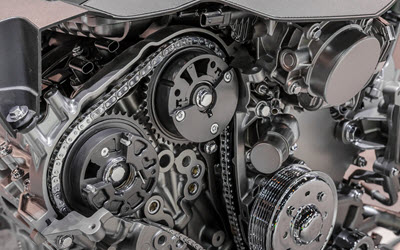The BMWs are known for their precision engineering, but certain models are prone to critical and costly issues, such as timing chain failure. The timing chain is the heart of the engine’s internal mechanisms and when it fails the consequences can be catastrophic causing extensive engine damage.
By taking the essential steps to deal with a potential BMW timing chain failure and recognizing the early warning signs, you can understand the repair process and prevent any minor issue from becoming an engine-destroying disaster.
Common Causes of Timing Chain Failure
- Poor maintenance: Extended oil change intervals or using low oil levels are major contributors. Contaminated or old oil provides inadequate lubrication and accelerates wear on the chain and its components.
- Worn timing chain guides: Over time, the plastic guides that keep the chain aligned can become brittle and break. These pieces can travel into the oil sump causing oil starvation and engine damage.
- Faulty chain tensioner: The chain tensioner applies hydraulic pressure to keep the chain taut. If this component fails then the chain can become loose and slap against the guides causing noise and eventual failure.
- Manufacturer Flaws: Certain BMW engines have inherent design weaknesses that make them more vulnerable to timing chain issues. In some cases the BMW has issued service bulletins or extended warranties for affected models.
Symptoms to Watch For
- Engine Rattling: A rattling noise during a cold start is the most common symptom. It can last for a few seconds before the oil pressure builds up and the tensioner does its job. Persistent rattling at idle from the engine is a strong indication of a loose chain.
- Engine Misfires: As the timing chain stretches it can throw off the engine’s timing. This leads to improper valve operation causing the engine to shake or run unevenly at idle. Incorrect valve timing can cause the engine to misfire causing a loss of power during acceleration.
- Check Engine Light: A stretched timing chain can trigger fault codes that indicate a misalignment between the camshaft and crankshaft. In severe cases the engine control module can put the vehicle in limp mode which restricts the performance to prevent further damage. This is an urgent warning sign that the chain is close to failure.
- Oil Contaminants: A mechanic can find the metal shavings in oil during a routine change. This is a sign that the chain or its guides are wearing down and shedding metal particles into the engine. If the broken chains guide pieces clog the oil pickup it can lead to oil starvation and a low oil pressure warning. This is a serious issue and requires immediate attention.
- Loss of Power or Poor Performance: A failing timing chain can disrupt the precise engine timing, resulting in reduced power and poor acceleration. The engine may struggle to run efficiently, resulting in it burning more fuel than usual.
Diagnosing and Solving BMW Timing Chain Failure
- Listening for any Noises: A loose or stretched timing chain can cause a metallic rattling or slapping sound when the engine is cold. It can disappear as the oil pressure builds and the chain tightens. A continuous rattling sound at idle is a more serious sign of a loose chain hitting the guides.
- Inspect the Tensioner: On some engines, removing the oil cap provides a view of the timing chain. Using a screwdriver, gently push on the chain to feel for excessive slack. A healthy tensioner provides firm resistance, while a failing one offers little to none. In some cases, the mechanics can replace the tensioner as a preventive measure, but this is a temporary fix for a larger problem.
- Professional Timing Chain Replacement: A proper repair involves repairing the entire timing chain kit. This includes the chain, all guides, tensioners, sprockets, and seals. On certain models, assessing the timing chain often requires engine removal, which increases the labor costs.
- Engine Rebuild: In engines like those of BMW, a broken timing chain can cause bent valves, damaged pistons, and other internal damage. Depending on the extent of the damage, the mechanic will either perform a full engine rebuild or, in certain scenarios, a complete engine replacement.
Why Brooklyn BMW owners trust Bay Diagnostic with their Timing Chains
A BMW timing chain failure is serious and  can be prevented by taking a proactive approach to vehicle maintenance, which includes following the manufacturer’s recommended oil change intervals, using high-quality oil, and paying attention to early warning signs, such as engine rattling or misfires. In this case, opting for professional inspection and using high-quality OEM parts is critical for long-term engine health and performance. For BMW owners in Brooklyn, NY, and the broader Manhattan area, Bay Diagnostic provides an expert solution with its specialized team of European vehicle technicians. Trusting your vehicle’s care to Bay Diagnostic not only ensures a meticulous and correct timing chain repair but also offers a transparent and customer-focused experience and protects your investment from a minor symptom becoming an engine-destroying disaster.
can be prevented by taking a proactive approach to vehicle maintenance, which includes following the manufacturer’s recommended oil change intervals, using high-quality oil, and paying attention to early warning signs, such as engine rattling or misfires. In this case, opting for professional inspection and using high-quality OEM parts is critical for long-term engine health and performance. For BMW owners in Brooklyn, NY, and the broader Manhattan area, Bay Diagnostic provides an expert solution with its specialized team of European vehicle technicians. Trusting your vehicle’s care to Bay Diagnostic not only ensures a meticulous and correct timing chain repair but also offers a transparent and customer-focused experience and protects your investment from a minor symptom becoming an engine-destroying disaster.

 1717 Gravesend Neck Road,
1717 Gravesend Neck Road,



